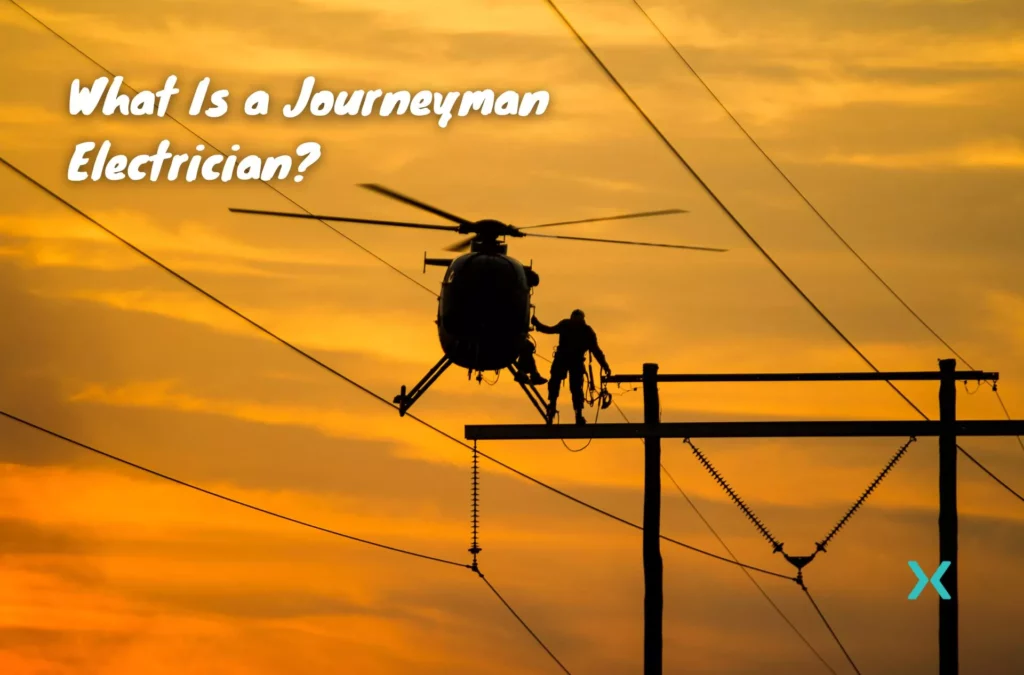Electricians are essential to almost every aspect of 21st-century life. Electrical services light homes, power computer systems, keep businesses running, and more.
Such electrical services rely on expert electricians to install them and keep them working safely and reliably. The apprenticeship and intensive journeyman electrician training necessary to become a master electrician reflect the importance of electrical workers’ tasks.
So what does it take to become a journeyman electrician?
Table of Contents
⭐ What Is the First Step Toward Becoming a Journeyman Electrician?

An electrical apprentice program is the first stage in training to become a journeyman electrician.
These are normally five-year programs.
During the apprenticeship, apprentice electricians learn about many things, including electrical power systems, lighting and security systems, energy management systems, and power distribution.
The apprentice learns from an experienced electrician, first by watching and later by completing tasks.
During an apprenticeship, on-the-job training tasks are strictly supervised, and as the apprentice gains experience, more independence is granted.
Apprenticeship programs often include periods during which the apprentice will attend a technical school or one of the local community colleges.
Such as those run by the National Electrical Contractors Association and the International Brotherhood of Electrical Workers (IBEW).
At technical schools, instructors explain the electrical theory and local and national electrical codes.
Training schools prepare apprentices for a written test that caps all apprenticeship programs.
Success in the test ends the apprenticeship training by qualifying the candidate for a journeyman electrician license.
⭐ How Is a Journeyman Electrician License or Certification Acquired?
On average, applicants licensed for certification as a journeyman electrician must have accumulated at least 8,000 hours of appropriate training and work experience, which usually takes between four and five years.
Typically, journeyman electrician candidates must also pass the written test to prove their understanding of electrical theory, as well as the National Electrical Code (NFPA 70) and the electrical codes of the state and municipality in which they plan to practice.
⭐ Do Journeyman Electricians Need a License?
This varies according to the state, but in most states, a journeyman electrician must be licensed or certified.
Licenses and certifications, if required, must be kept up to date by regular renewal.
In some states, this means a journeyman electrician must stay on top of changes to best practices and electrical codes by completing continuing education credits.
⭐ What Is a Journeyman Electrician Qualified to Do?
A journeyman electrician is fully qualified to install, maintain, and repair all types and sizes of electrical systems, from those in private homes to those running large commercial or industrial facilities.
Journeyman electrician jobs generally fall into two categories: journeyman outside lineman or journeyman inside wireman.
Each of these jobs entails a unique set of electrical job duties.
⚡ Outside Linemen
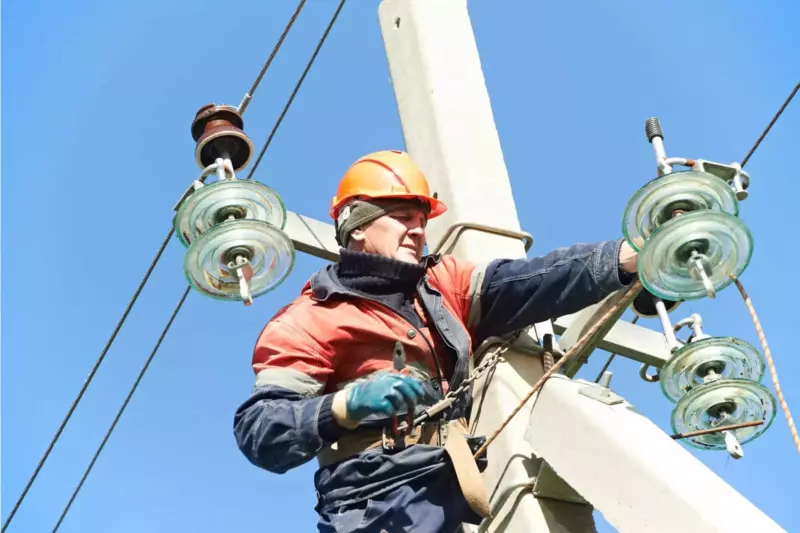
A journeyman outside lineman connects and maintains the external electrical power supply, from the generation plant to the building or facility’s power meter.
Outside linemen also work on public utilities, such as street lights and traffic signals.
The daily tasks of outside linemen include:
- Substation construction and maintenance.
- Installation and service of insulators and circuit breakers.
- Electrical transformers and other equipment installation and service.
- Subterranean electrical distribution system installation and service.
- Overhead electrical transmission line installation and service.
- Electric tower and pole setting.
- Stringing of new wires and existing wire maintenance.
⚡ Inside Wiremen
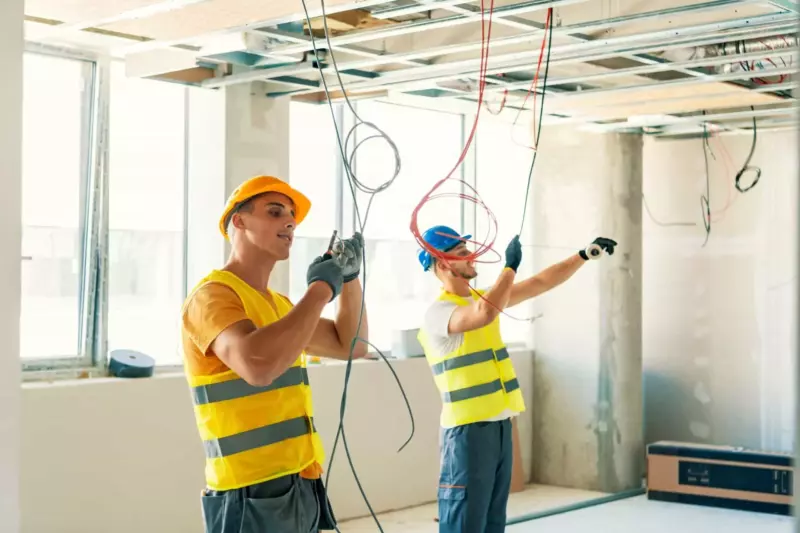
A journeyman inside wiremen works for residential, commercial, and industrial customers, connecting electrical circuits to the power meter.
They also maintain electrical systems within these facilities.
The duties of inside wiremen include:
- Construction and maintenance of power generation equipment, including transformers, breakers, and switches.
- Installing electrical grounding systems.
- Installation and service of main electrical panels, including circuit breakers and switching gear.
- Installation and service of the mains to facility power feed.
- Installation and service of energy management systems.
- Installation and service of telephone and other communications systems.
- Installation and service of electrical conduits and junction boxes.
- Installation of new wiring.
- Maintenance and repair of existing wiring.
- Installation of lighting control systems and fixtures.
- Installation and service of heating equipment.
- Installation and service of fire alarm systems and other security systems.
- Installation of electrical service between buildings.
- Installation and service of temporary power systems on a construction job site.
- Troubleshooting and repair of faulty equipment and electrical systems.
During the journeyman electrician stage of their careers, many inside wiremen start specializing in one of three main areas of electrical service: residential, commercial, or industrial.
⭐ Residential Journeyman Electricians
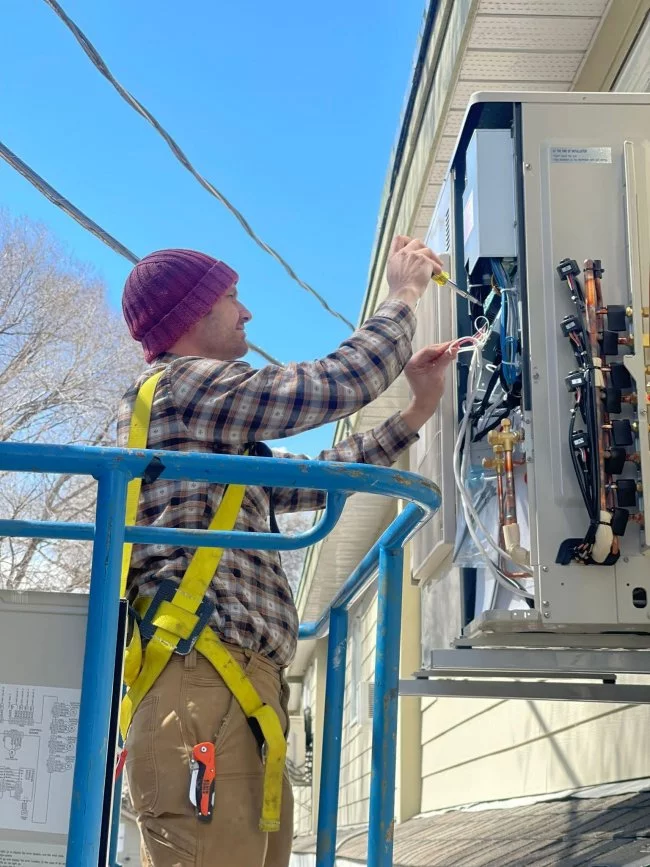
Most people are familiar with residential electricians installing, inspecting, or repairing household electrical equipment.
Residential electricians can be self-employed and work independently for residential customers, or they can work for an electrical company owned by a master electrician.
The journeyman electrician or electrical company can work directly for homeowners or be subcontracted through a building contractor.
Residential electricians’ tasks include:
- Reading and following blueprints.
- Installing new wire systems, electrical fixtures, and other electrical components.
- Connecting residences to the electrical grid.
- Diagnosing faults and repairing existing wiring systems.
- Replacing broken electrical system elements.
- Ensuring electrical construction meets requirements for local and national electrical codes.
⭐ Commercial Journeyman Electricians
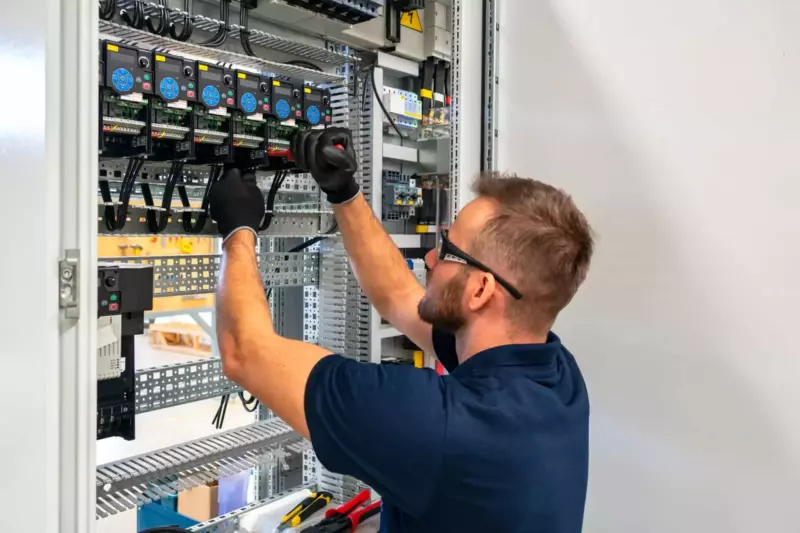
Commercial journeyman electricians need slightly different skills.
They often work for the construction industry full-time or for a specific period on construction job sites.
Commercial electricians are often commissioned for major and complex projects.
Electrical tasks for a commercial electrician include:
- Following complex blueprints and instructions and intricate wiring plans.
- Sourcing material for specialist projects.
- Installing specialist electrical equipment, including entire building lighting control systems, security systems, and building energy consumption monitoring and regulating systems.
- Installing conduits.
- Mounting equipment, including panel boards, transformers, transfer switches, and switch gears.
- Adding wiring to existing systems.
- Troubleshooting and repairing electrical system faults.
- Ensuring compliance with safety standards and local electrical and building codes.
Commercial electricians must be available immediately for electrical work, and if this often involves traveling, the journeyman electrician may be provided with a work van and expected to drive it to job sites.
Commercial electricians who work hard and prove their abilities may be promoted to the position of foreman.
The foreman’s responsibilities include reviewing work orders and plans, delegating work, liaising with other trades on the sites, and ensuring safety regulations are followed.
A foreman can expect about 5% higher wages than a journeyman electrician.
⭐ Industrial Journeyman Electricians
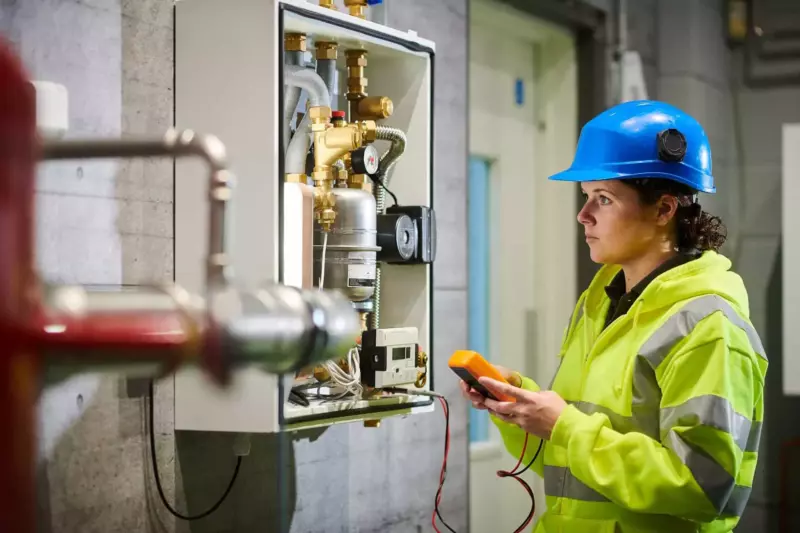
Last but not least are industrial journeyman electricians who specialize in installing and maintaining electrical equipment and systems in industrial settings.
Many industrial electricians are full-time employees, often in maintenance departments within the company whose electrical systems they ensure run smoothly and safely.
Industrial electricians work in facilities belonging to manufacturing industries, shipyards, power generating plants, mines, oil rigs, and other large entities, some of which require electricians to obtain additional training and accreditation.
Industrial electricians’ work includes the following:
- Reading blueprints, diagrams, and plans.
- Having familiarity with major electrical equipment systems, including safety procedures and protocols for emergencies.
- Installing equipment, electrical wiring, lighting systems, and system control devices.
- Maintaining important equipment, such as variable frequency drives (VFDs) generators, pumps, motors, and other equipment.
- Using a variety of electrical meters to troubleshoot and repair faults in system wiring and other components.
⭐ Do Journeyman Electricians Have to Belong to Labor Unions?
Upon commencing apprenticeship, electricians must join labor unions, which offer many benefits as well as protection from unfair employment practices.
⭐ The Differences Between Journeyman Electricians and Master Electricians
In most states, master electricians can own their own electrical companies and have apprentices.
They can apply for electrical work permits and are often chosen as foremen on construction projects. They make more money than journeyman electricians.
After proving themselves throughout several years of excellent journeyman training, journeyman electricians can qualify to become master electricians.
⭐ How to Become a Master Electrician
Requirements vary from state to state, but on average, a journeyman electrician must work a total of two years and 12,000 hours to be able to take the master electrician exam and gain a master electrician license.
The master electrician exam tests all the knowledge of the electrical trade journeymen electricians should have gained during training.
⭐ Job Prospects

According to the U.S. Bureau of Labor Statistics, the projected growth in job prospects for electricians stands at 8% per annum, which is double the average job growth projection.
In numbers, the job outlook means that America is going to need an extra 62,000 electricians.
In short, the prospects for apprentice electricians, journeyman electricians, and master electricians look pretty good!
According to labor statistics, the reasons for this growth in electrician demand include an increase in population numbers, the need for electrical updates to existing properties due to aging infrastructure and the demands advancing technologies make on electrical systems.
⭐ Contact Us For Your Electrical Needs

Phyxter Electrical Services is a co-op of local independent contractors who offer outstanding electrician service for your needs.
Every electrical contractor on our team is highly trained and conversant with local electrical codes.
We always charge fair prices, and our work is backed by a comprehensive guarantee.
If you live in the Okanagan Valley and require the services of an Electrical Contractor for your home improvement project, call us at (778) 745-0041 or check out our page for more information on our electrical and lighting services.

